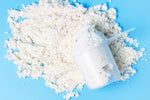
Almond Protein for Muscle Building
, by Sandesh Prasannakumar, 10 min reading time
Stay tuned, Your Favourite supplements will be back in stock soon!
Stay tuned, Your Favourite supplements will be back in stock soon!
Stay tuned, Your Favourite supplements will be back in stock soon!
Stay tuned, Your Favourite supplements will be back in stock soon!
Stay tuned, Your Favourite supplements will be back in stock soon!
Stay tuned, Your Favourite supplements will be back in stock soon!
Stay tuned, Your Favourite supplements will be back in stock soon!
Stay tuned, Your Favourite supplements will be back in stock soon!
Stay tuned, Your Favourite supplements will be back in stock soon!
Stay tuned, Your Favourite supplements will be back in stock soon!

, by Sandesh Prasannakumar, 10 min reading time
Gaining muscles is one of the major aims that many people including fitness lovers, athletes, and those involved in bodybuilding have. Protein is regarded as an important nutrient that is involved in the building up of muscles and repair work, and there are so many types of protein available in the market. Almond protein, a protein obtained from almonds, has recently become popular due to the need to find an alternative to animal protein. This article aims to provide information on how the almond protein is functional for muscle mass, its composition, and usage.
Muscle building could not be easy without the help of protein. It is formed by amino acids, which are the basic constituents of muscle mass. When a person exercises, his muscles exert pressure on the surrounding fibers thus pulling them; the protein works to fix the torn muscles and construct them a little bit stronger. Proteins are important in muscle buildup, repair and replenishment hence adequate intake of protein helps in this aspect.
Almond protein is made from finely ground almonds that are said to have been defatted through most of the fat-bearing portion in almonds. There are several reasons why almond protein is gaining popularity among fitness enthusiasts.
Almonds are nutrient-dense and provide a variety of essential nutrients that support overall health and muscle building.
Considering its suitability, almond protein is highly recommendable to individuals who avoid animal products in their diet or are sensitive to some types of proteins such as whey protein and soy protein. It also lacks gluten thus it can be preferred by those who have gluten issues or who have been diagnosed with celiac disease.
Almond protein is a more sustainable protein source than animal-based proteins. Almond cultivation has a lower environmental impact. This is especially true for greenhouse gas emissions, compared to livestock farming.
The necessary amino acids from almond protein help in muscle repair and growth. While this content is lower than animal-based proteins, it can still be effective when combined with other protein sources. Or, when you consume it as part of a varied diet.
Almond protein offers a combination of protein, healthy fats, and micronutrients. This helps in enhanced athletic performance and speedy recovery after intense workouts. Magnesium, in particular, is key in muscle contraction and relaxation. This part is essential for performance and recovery.
Almond protein can aid in weight management. This is also crucial for muscle definition. Its fiber and healthy fats help promote satiety. Thus, your overall calorie intake is reduced. The result is a healthy body composition.
One of the easiest ways to incorporate almond protein into your diet is by adding it to smoothies. Here’s a simple recipe to get you started:
Another delicious way to enjoy almond protein is by making protein pancakes:
Homemade protein bars are a convenient and portable snack option:
To ensure you get a complete amino acid profile, consider combining almond protein with other protein sources. For example, you can mix almond protein powder with pea protein or rice protein. This combination can help provide all the essential amino acids your body needs for optimal muscle building.
While almond protein has many benefits, it is important to consider potential drawbacks:
Almond protein is lower in certain essential amino acids, such as lysine and methionine, compared to animal-based proteins. To address this, combine it with other protein sources or ensure a varied diet to meet all amino acid needs.
While almond protein is a great alternative for those with dairy or soy allergies, it is not suitable for individuals with nut allergies. Always check for potential allergens before incorporating a new protein source into your diet.
Almond protein can be more expensive than other protein powders. However, the nutritional benefits and suitability for various dietary restrictions can make it a worthwhile investment.
Almond protein is a versatile and nutritious option for muscle building. Its rich nutrient profile, plant-based nature, and hypoallergenic properties make it an excellent choice for a wide range of individuals. By incorporating almond protein into your diet through smoothies, pancakes, bars, and other creative recipes, you can support muscle repair, enhance performance, and promote overall health. Remember to combine it with other protein sources and maintain a balanced diet to ensure you receive all the essential amino acids needed for optimal muscle growth and recovery.
For all your protein and supplement needs, visit Genetic Nutrition!